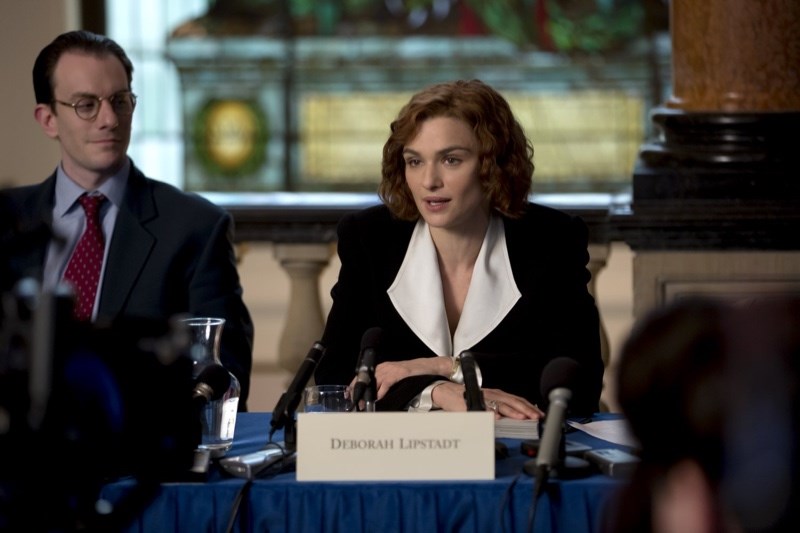Methodically constructed and seamlessly executed, Denial delineates the 1996 court case between American author Deborah Lipstadt and debunked British historian/Holocaust denier David Irving.
Missing from the proceedings, however, is an emotional component that would have elevated Mick Jackson’s drama from smart to superb and stoked more outrage from viewers.
Professor Lipstadt (Rachel Weisz) is giving a lecture at Atlanta’s Emory University when she is ambushed by Irving (Timothy Spall), a fan of Hitler and well-known Holocaust doubter whom she has called a liar in her recent book. As someone determined not to engage with people who say the Holocaust didn’t exist, being lured into a discussion — and worse, having it filmed by an Irving flunkie for distribution on the Internet — is demoralizing for Lipstadt. “You can have opinions about the Holocaust, but I won’t meet with anyone who says it didn’t happen.”
Ever the showman, Irving waves $1,000 to the college crowd, offering it to anyone who can prove the Holocaust happened. He famously said in a speech that “more women died in the back seat of Senator Edward Kennedy’s car at Chappaquiddick” than ever died at Auschwitz.
Not long after, a suit is leveled against Lipstadt and her publisher, Penguin Books, by Irving for defamation of character. Because the suit is brought in England the burden of proof lies with the accused, meaning that Lipstadt and her team (including Andrew Scott as Anthony Julius, the lawyer who handled Lady Diana’s divorce) are tasked with proving — more or less — that Irving is lying and that people were indeed gassed at Auschwitz during the Holocaust.
There is a divide among the Jewish population in London about how to silence Irving: “Settle,” says a wealthy donor, “we’ve lived with worse.” But the case is also attended by concentration-camp survivors desperate to have their voices heard.
Also being silenced is Lipstadt herself: she will not take the stand in her own defense. “Stay seated, button your lip, and win,” instructs Julius. Thus the denial in the title refers both to Irving’s refusal to accept that six million Jews were slaughtered, as well as the self-denial Lipstadt has to master if she wants to win the case.
Enter libel lawyer Richard Rampton (Tom Wilkinson), who will argue the case in the courtroom. Things between him and his client get off to a rocky start: Howard Shore’s score recedes into the background during a scene at Auschwitz, where Lipstadt, Rampton and others take a somber tour of the ruins, gathering information. Rampton’s clinical response infuriates a tearful Lipstadt, who responds to his perceived coldness by saying a Jewish prayer for the dead at the site.
But thank goodness for Rampton, for the case and for the audience. The reliably excellent Wilkinson is the most human character in the film; he also delivers the film’s most potent emotional punch (after the verdict is rendered) by not saying a single word.
Weisz is suitably fiery as the outraged Lipstadt, in a role that might have exposed more of the woman’s personal history. Spall (remarkably changed by recent weight loss) is also great as the repugnant charmer who penned a racist song for his infant daughter and defended charges of racism by saying that among members of his household staff he had employed several Jamaican and Pakistani nannies who had attractive breasts.
“What you can’t do is lie and expect not to be accountable for it... The earth is round, the icecaps are melting, and Elvis is not alive.” Parallels to America’s current political campaign aside, Denial is an important — if occasionally sterile — examination of where the parameters of free speech lie.
Denial opens Friday at Fifth Avenue. Â



